On Tuesday, we ran through the one big question facing each of the first 16 teams to play in Qatar. Today, we're back with analysis for everyone from Morocco to Brazil in Groups E to H, who played on Days 4 and 5.
Can Germany bounce back? Are Spain unstoppable? And, uh, does someone want to poke Belgium with a stick? We've got all that and plenty more below. As always, all stats come courtesy of Stats Perform unless otherwise noted.
Group E
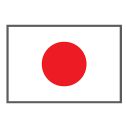 Japan: Is Shuichi Gonda the Memo Ochoa of Japan?
Japan: Is Shuichi Gonda the Memo Ochoa of Japan?
It wasn't quite Saudi Arabia over Argentina, but it was close. After getting pummeled for 75 minutes, Japan sucker punched Germany twice and stole a famous, title-landscape-shifting victory. In case you're still unfamiliar, expected goals is a statistic that determines the average conversion probability of a given shot, based on a number of contextual and historical characteristics. Look on this chart and despair, or rejoice:
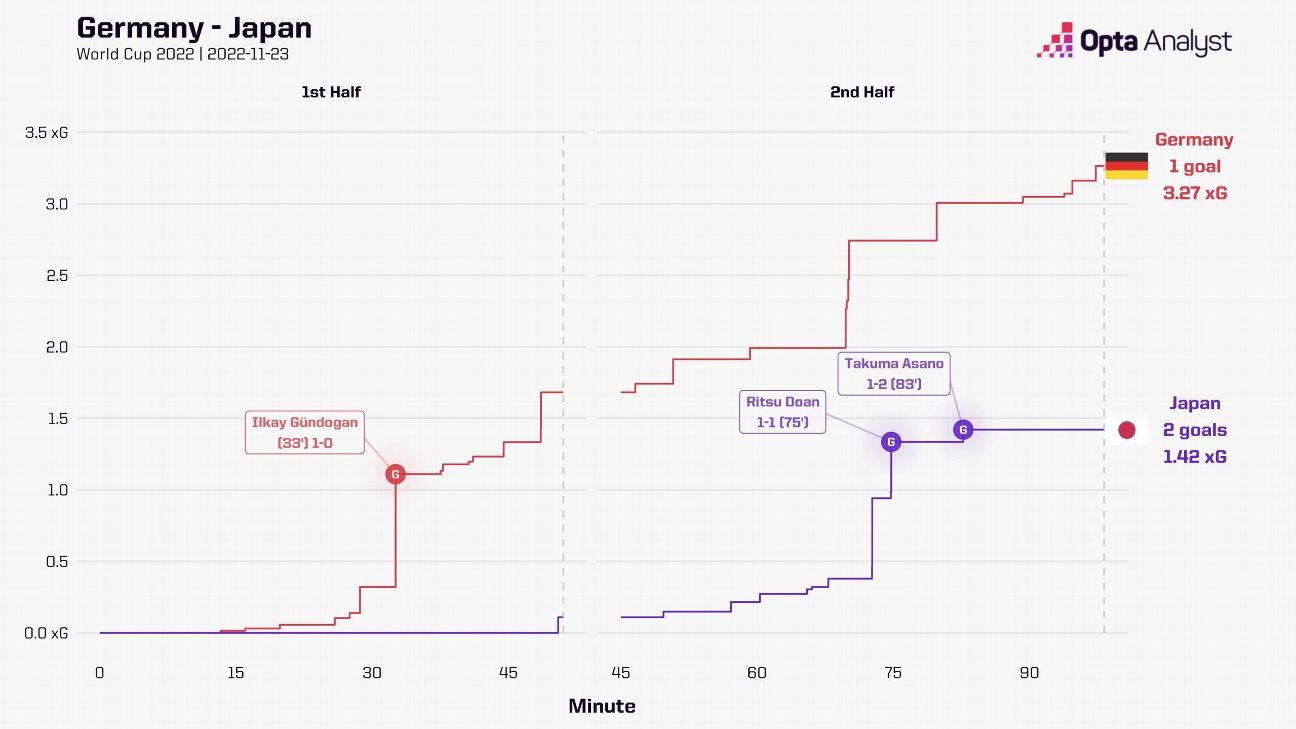
Since the data was first recorded back in 1966, Germany became the second-ever team to control more than 73.5% of the possession in a World Cup match and lose. The only other team? Germany, in their previous World Cup game, a 2-0 loss to South Korea in their final group stage match in 2018.
Of course, possession is useless unless you turn it into chances -- but Germany did that, to an almost absurd degree. In fact, the company Opta went back and calculated the xG values for every World Cup shot since 1966, and against Japan, Germany became the first team to record at least 3.3 expected goals in a match and lose.
Of course, all of those shots are useless if you don't put them on frame, but they did that, too! Nine of the 27 were on goal, but they only scored on Ilkay Gundogan's penalty. In other words, 33-year-old Shuichi Gonda, who has spent almost all of his career in Japan's domestic league, saved all eight of Germany's non-penalty attempts.
As we discussed on Tuesday, Stats Perform also calculates expected goals on target, which looks at where the shots were attempted from and where they ended up on the goal frame. Per this metric, the German shots were worth 2.85 xGOT. They scored one, so Gonda saved nearly two goals more than expected (1.85). Circles are sized by the quality of the chance:
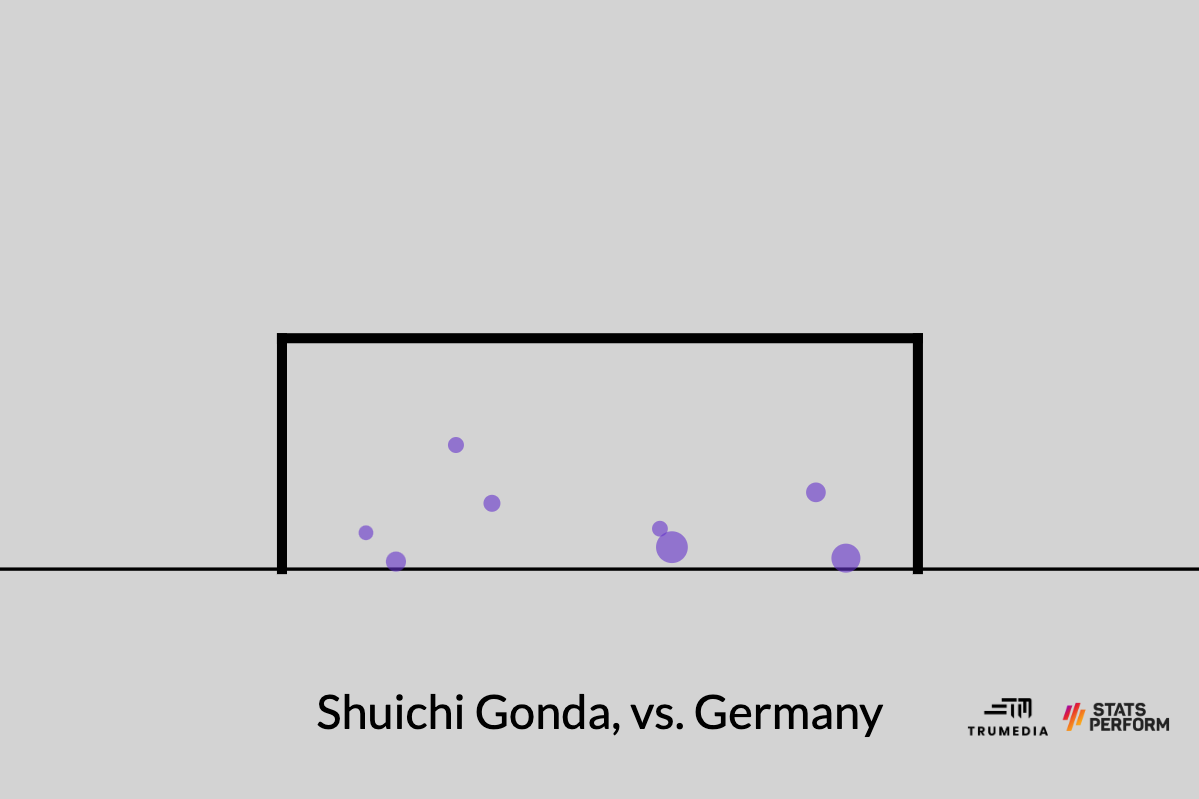
In the NHL, there's a cliché that the team that wins the Stanley Cup is just the team with the hottest goalie. That's not quite true at the World Cup, but it could be the reason why Japan advance to the round of 16.
 Germany: Will the bounces ever go their way again?
Germany: Will the bounces ever go their way again?
Former English striker and current BBC commentator Gary Lineker once famously said, "Football is a simple game. Twenty-two men chase a ball for 90 minutes and at the end, the Germans always win."
For the vast majority of soccer history, that was true. High-flying, beloved attacking teams such as Hungary and the Netherlands were suddenly scythed down by the -- accurate stereotype alert -- organized and efficient Germans. Their win in 1954 was known as the Miracle at Bern -- the Germans ended Hungary's 31-game unbeaten streak, despite getting outshot 26-15 in the final. Then, in 1974, they beat Johan Cruyff''s revolutionary Total Football Netherlands, who were playing a positionless brand of soccer no one had ever seen before.
These pass maps show players by their average positioning, but when everyone is everywhere, well ...
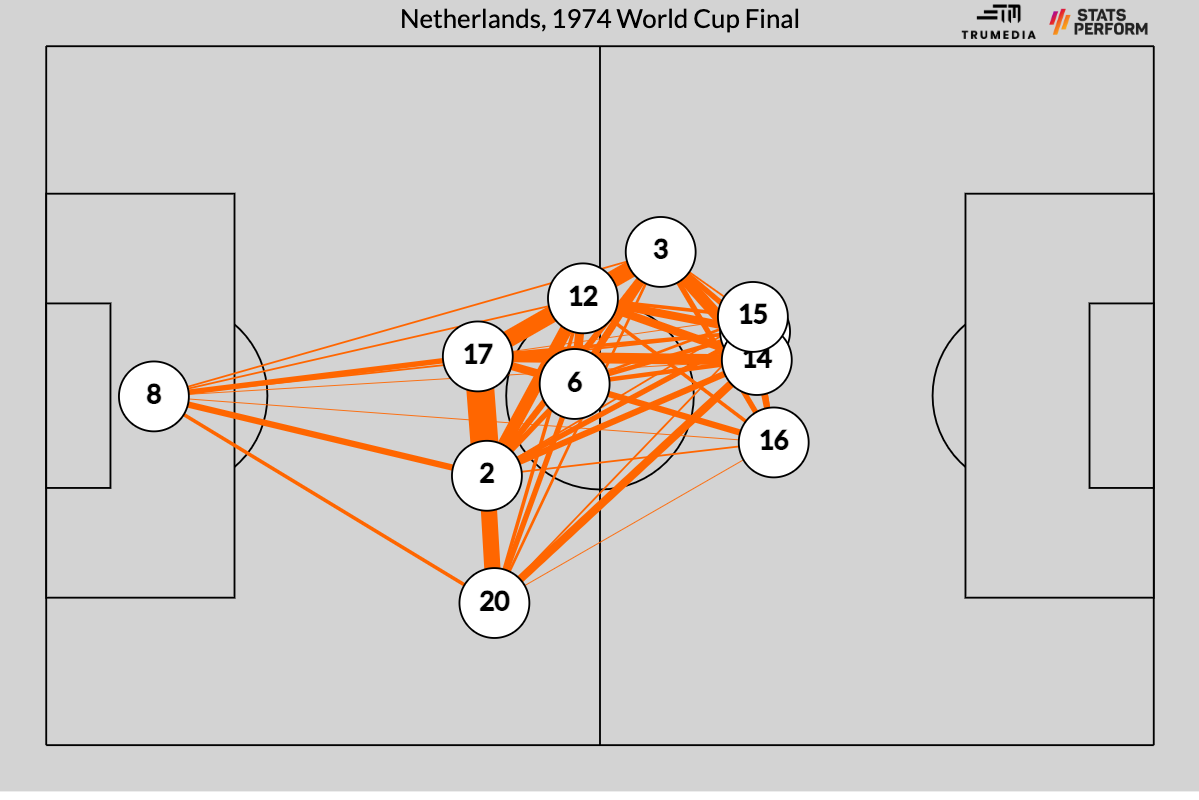
Anyway, the Dutch outshot and out-created the Germans and still lost:
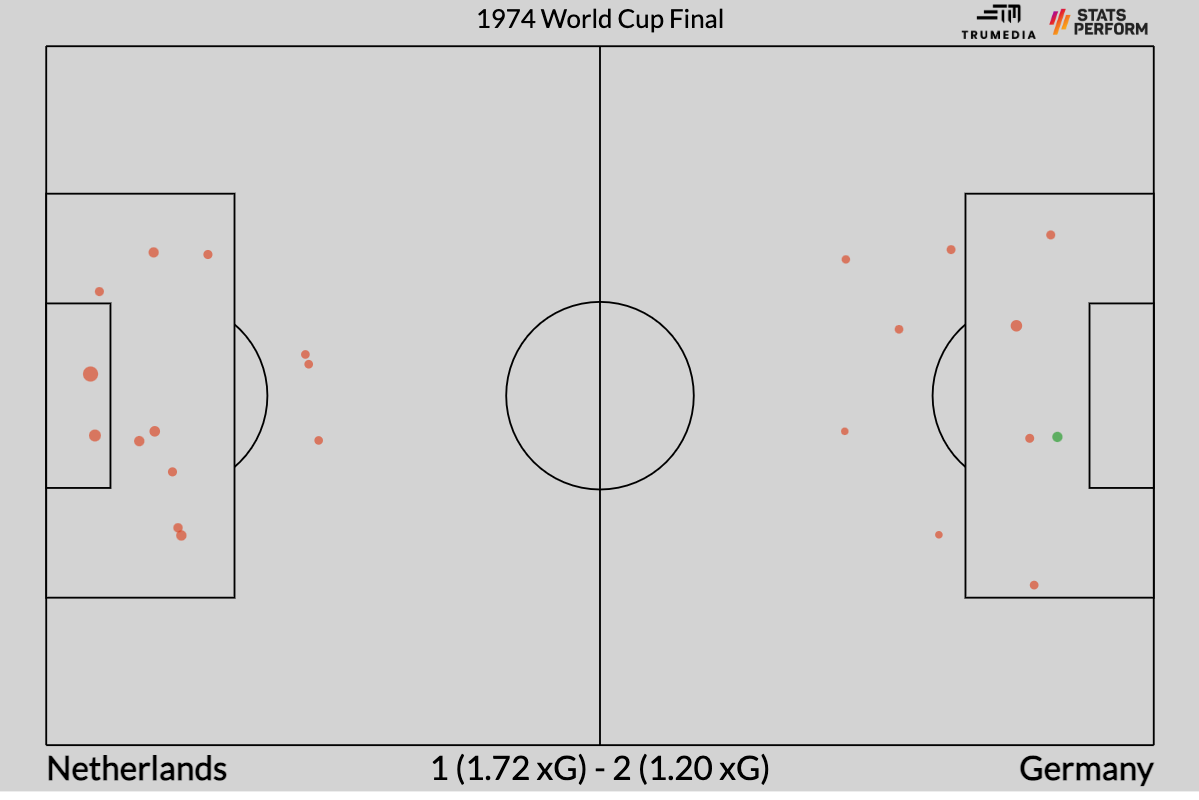
However, after winning the 2014 World Cup, it's almost like Germany is now cramming a century's worth of regression to the mean into four World Cup games. Here are the top-line stats since the start of the 2018 World Cup:
Shots: 98
Shots against: 44
Final-third possession: 80%
Touches in opposition penalty area: 178
Touches allowed in own penalty area: 70
Expected goals: 8.76
Expected goals allowed: 5.38
Goals: 3
Goals allowed: 6
Wins: 1
Losses: 3
Even if their results finally begin to match their performances, it might already be too late. With Spain up next, FiveThirtyEight gives Hansi Flick & Co. a 33% chance of making it out of the group.
 Spain: Can they keep keeping control?
Spain: Can they keep keeping control?
Soccer is supposed to be a game of trade-offs. Champions League-winning manager Rafa Benitez has compared it to having a short blanket: "If you cover your head, you have your feet cold, but if you cover your feet, you have your head cold." Just take Germany; they dialed up the attack against Japan, and as a result, conceded a number of high-quality chances. It works in the other direction, too; you can beef up your defense via formations or personnel, but usually that means you're removing some of your attacking capacity.
Good managers, then, know where to put the blanket. Great managers figure out a way to stretch it out. And well, against Costa Rica, Luis Enrique's blanket covered the entire damn field.
Employing a lineup that featured seven recognized midfielders and three defenders, Spain controlled 81.3% of possession -- the most in a single World Cup match since 1966. They attempted 17 shots worth 3.48 xG. They scored seven goals. Oh, and they didn't concede a single shot, which has only happened one other time since 1966.
You're supposed to concede some chances on the counter-attack when you leverage that much high possession in your favor. And when you attempt that many shots, you're not supposed to have them all be so high-quality. Instead, Spain got all of the great things, with none of the downsides. It's truly one of the most dominant single-game performances I've ever seen. They did everything well, and nothing poorly.
With the way they attempt to play -- high pressing, complex rotations and passing combinations -- Spain are the only team in the field capable of producing a performance like that. Luis Enrique has ignored set pieces and left a number of stars off his roster in service of those ideals. But strangely, Spain were so good in this game that we still don't really know how good they are. If they can dominate every game like this, they're going to win the World Cup. But what happens when they can't hold more than 80% of the ball and can't keep their opponents from attempting a single shot? With Germany next, we'll soon find out.
 Costa Rica: How 'bout just one?
Costa Rica: How 'bout just one?
This, apparently, is football heritage:
Costa Rica was held without a shot today in its 7-0 loss vs Spain.
— ESPN Stats & Info (@ESPNStatsInfo) November 23, 2022
The only other time that a team was held without a shot in a #FIFAWorldCup match since 1966 was ... Costa Rica in 1990 vs Brazil. pic.twitter.com/0AKJtmzhZ6
Group F
 Belgium: What if that's it?
Belgium: What if that's it?
Argentina lost to Saudi Arabia. Germany lost to Japan. Belgium beat Canada -- and Belgium were easily the least impressive "favorite" from the first round of matches. See if you can figure out who's No. 2 in the FIFA rankings and who's No. 41:
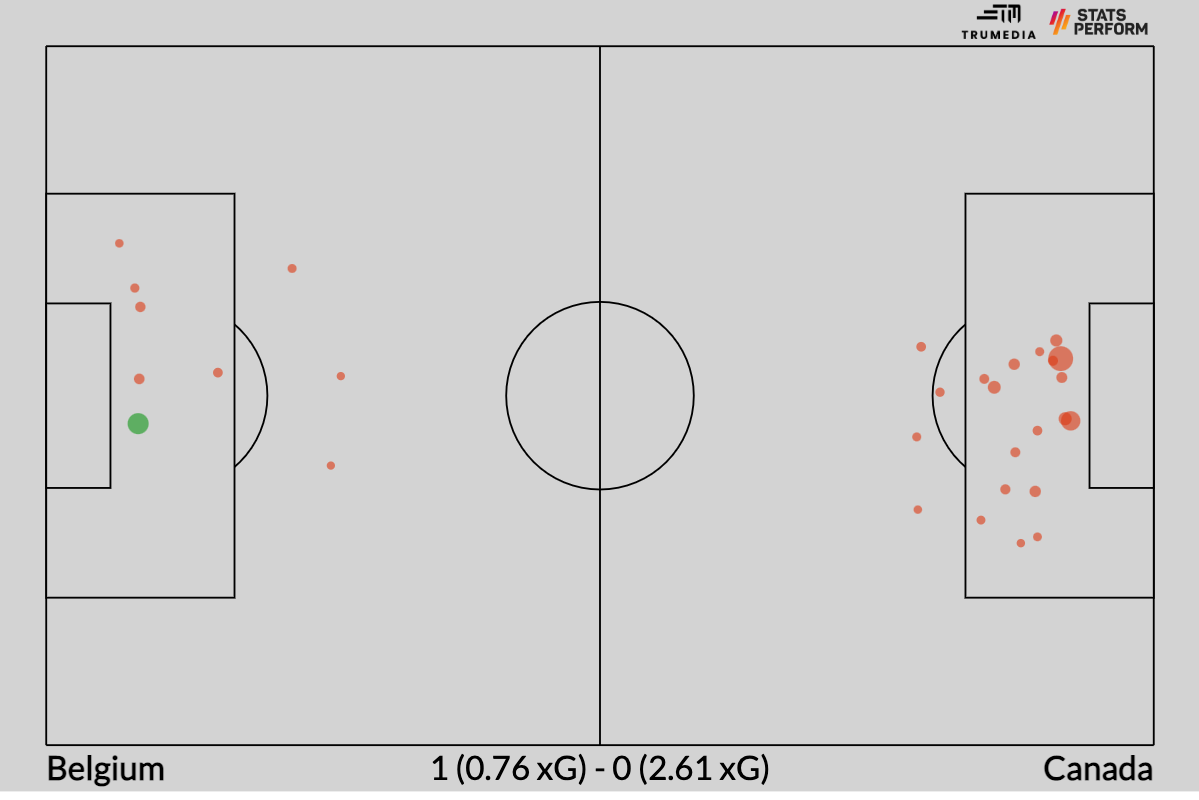
Despite the scoreline, Belgium got absolutely dominated by Canada, who became the first team since 1978 to attempt 20 shots and a penalty in a World Cup game without scoring a goal.
While the Belgians managed 53% of the total possession, Canada had all the possession that actually mattered. John Herdman's team carried 64% of the final-third possession, and they took 36 touches inside the penalty area while only conceding 16. This wasn't just a couple of counter-attacks that led to high-quality chances; Canada controlled every important aspect of the match other than, you know, the only one that really matters. Belgium's best player seemed to agree, too:
Kevin De Bruyne on winning man of the match in #bel v #can: "I don't know why I got the trophy. Maybe it is because of the name."
— James Olley (@JamesOlley) November 23, 2022
They've got the points in the bag, but Belgium really do seem like they're reeling. While you'll hear announcers talk about their golden generation, that's over. Across their starting XI, Manchester City's Kevin De Bruyne is the only outfield player who starts for a club team still in the Champions League. He's surrounded by some younger players who aren't quite as good as the guys they've replaced, or older guys who have been around forever and simply just aren't very good anymore. Eden Hazard is famous and plays for Real Madrid, but he hasn't been a relevant player for years now. Same goes for centre-backs Jan Vertonghen and Toby Alderweireld.
It's amazing that Belgium have ascended so high in the world rankings; the country has about as big a population (11.6 million) as Ohio (11.8m). But the names on the roster and the recent success obscure the current reality and what's likely to be their reality going forward; this is a team that would be lucky to even make the quarterfinals.
 Canada: Was that their best shot?
Canada: Was that their best shot?
You just read about how good Canada were at everything other than kicking the ball into the goal. Across a full club-soccer season, a great performance coupled with a poor result is still a net positive. It suggests you're more likely to play well in the future, and it's just one match out of 38. But, well, the loss to Belgium represents one-third of their World Cup "season."
There's no reason to fear Belgium going forward. They might get their act together and play a bit better, but would anyone be surprised if they don't win another game? And the draw between Morocco and Croatia also means that Canada is still only one point out of second. They maintain a 26% chance of advancing, per FiveThirtyEight.
But the worry -- beyond the pure loss of points -- for the Canadians going forward would be that they already maxed everything out. After Belgium made subs at half, Canada was mostly ineffective, attempting only eight of their 22 shots after halftime and conceding more penalty area touches (11) than they created (10). Their athleticism and their style of play can be jarring, but Belgium started to figure it out over the second 45, and now that's on tape for Croatia and Morocco.
On top of that, Belgium -- a really old team that wants to play wide-open matches in space -- were a really good matchup for a speedy Canadian team that flourish in the same areas. Croatia are old, but their midfield lets them control matches in a way that Belgium cannot, while Morocco are one of the youngest teams in the competition and like to play a similar way as the Canadians.
I could be wrong, but I think Canada is going to have a much harder time creating chances over their next two games.
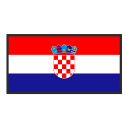
 Croatia and Morocco: Can you give us a reason to wake up next time?
Croatia and Morocco: Can you give us a reason to wake up next time?
I hope you -- and everyone else -- slept through this match. Neither team scored, and neither one created more than 0.52 expected goals. In the second half, the two teams combined for four shots. Croatia's only second-half attempt came from centre-back Dejan Lovren, while neither team took a shot after the 65th minute. Y'all really made us wait four years for that?
I award you one point, and may God have mercy on your soul.
Group G
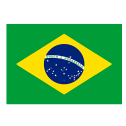 Brazil: Do they have a key or only a hammer?
Brazil: Do they have a key or only a hammer?
After being frustrated throughout the first half, Brazil ultimately and totally overwhelmed Serbia under a barrage of 22 shots. When you rip off that many attempts, no matter how difficult they are, good things tend to happen. Like, say, a keeper tipping a rebound directly onto the foot of your centre-forward or, perhaps, that same centre-forward mishandling his first touch and then salvaging it by smoking a roundhouse bicycle kick into the back of the net.
But so much of what Brazil did against Serbia felt unimaginative. Over and over and over again, an attacker would cut it from the left, try to bend a ball into the far corner and fail. Just look at all the shots that came from that area of the field:
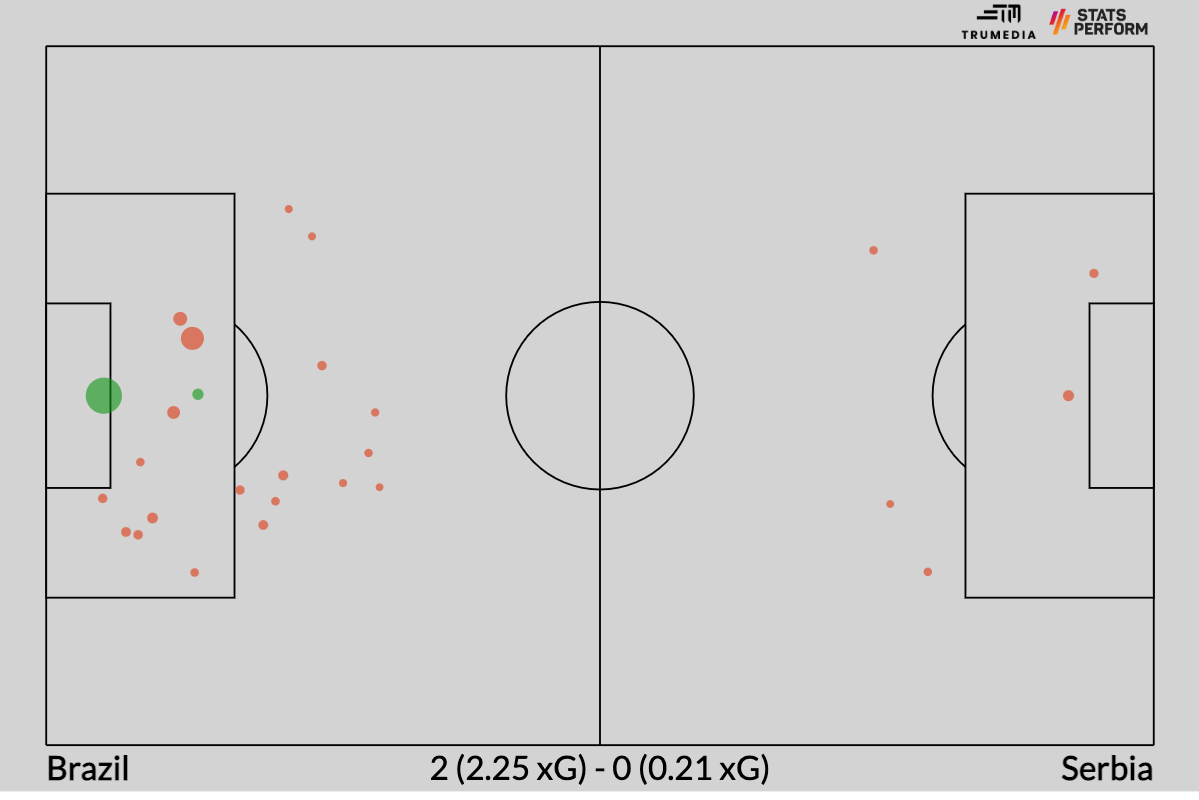
The majority of their shots came from the space between the left post and the left sideline, and as the size of those dots suggest, none of 'em were good chances. The two high-quality opportunities came from a rebound off of one of those shots, and then earlier, off a high-press where Raphinha (the right winger) won the ball and broke in on goal. In other words, their two best chances of the match came off a rebound and a defensive action. They weren't able to create anything from their own passing.
This, of course, is nit-picking. FiveThirtyEight rates Serbia as the 14th-best team in the tournament, so it wasn't like they were getting frustrated by Saudi Arabia or Costa Rica. And, well, this team's strength -- despite all of their star power upfront -- is their defense. They conceded just five touches in their own box, in addition to just five shots worth 0.21 xG -- the second-lowest per-shot quality allowed of any team so far behind Spain, who didn't concede a single attempt. But, well, these guys are the favorites to win the whole thing.
The baseline assumption was that they're the best team in the tournament; that still should be what we work from, but there's at least a very minor question -- especially with Neymar's health now in doubt -- over how fluid their attack will be.
 Serbia: Can they create once they get the ball?
Serbia: Can they create once they get the ball?
Serbia deserves some credit for everything you just read, too. They executed really well defensively, and they still got buried. Brazil will do that to you. But if the Serbs can pair that defensive solidity with some -- frankly, any -- attacking production, they've still got a real shot to advance out of this group.
Despite having just 32% of the final-third possession, they won possession in the attacking third six times -- more than all but six other sides through one match. However, none of their three star attackers -- Fulham's Aleksandar Mitrovic, Ajax's Dusan Tadic and Lazio's Sergej Milinkovic-Savic -- attempted a single shot. We shouldn't expect that to continue in their future matches against Anyone Other than the Best Defense in the World.
 Switzerland: Where are the shots?
Switzerland: Where are the shots?
Their only goal in their 1-0 win over Cameroon was beautiful -- maybe my favorite of the tournament so far. It had the know-it-when-you-see-it buildup pass that moves the possession into a higher gear. It had a savvy turn and pass from an attacker with his back to goal. It featured a nice little cutback pass that used the defense's momentum against it. And then it was finished off by a run that wasn't a run; Breel Embolo just slowed down, the defenders kept dropping and he got his goal:
Breel Embolo puts Switzerland on top and decides not to celebrate his goal against Cameroon, his birth country 🙌 pic.twitter.com/7amWCNa9kD
— FOX Soccer (@FOXSoccer) November 24, 2022
Although the Swiss created the better chances, they still only ended the match with seven shots, and they took just 15 touches in Cameroon's penalty area while conceding 19 in their own. Through the first round of matches, Switzerland averaged the highest xG per shot of any team (0.21), but they didn't do much of the other stuff that typically leads to goals being scored.
When you have that little penalty area possession and so few attempts on goal, your execution has to be lights-out. It was against Cameroon, but that's a really thin tightrope to keep walking.
 Cameroon: Can you take us to the future?
Cameroon: Can you take us to the future?
If a team aren't going to be contenders, then here is all we ask: just be interesting. Cameroon, you guys have absolutely passed the test.
The goalkeeping centre-back.
— Opta Analyst (@OptaAnalyst) November 24, 2022
26 of André Onana 61 touches came outside the box against Switzerland/#FIFAWorldCup pic.twitter.com/rbU0U7VDez
Those 26 touches outside the penalty area for Andre Onana are the most ever by a keeper at the World Cup since the stats were first recorded in 1966. With the seemingly unstoppable growth of the club game over the past two decades, tactical trends in international soccer now lag behind what's happening in the Premier League every weekend. Not this, though. While keepers are now way more aggressive in coming off their line to clear balls over the top and are also frequently employed to facilitate possession from inside their own box, Onana was basically playing as a centre-back at times.
The risks are obvious, but so are the benefits. When you use all 11 players in possession, you're simply a lot harder to defend against since the other keeper isn't marking anyone. You have an extra man. Plus, I think if teams see a keeper that far out of goal, they'll then be more likely to try to win the ball back high up the field, and that would create all kinds of gaps within the opposition's defensive structure. If you're an underdog and you've got a special keeper like Onana, then why not try it?
Brazil are next. Please keep it up.
Group H
 Portugal: Should Ronaldo start?
Portugal: Should Ronaldo start?
He is going to start. This isn't a question. The majority of the soccer world, including Portugal manager Fernando Santos, seems blissfully unaware that Ronaldo is 37 years old and nowhere near the field-spanning, dribble-happy shot-creator who was scoring 40-plus goals a year for Real Madrid from the wing. That dude is long gone.
The new Ronaldo is a physically limited poacher who only affects play by getting shots. He doesn't contribute to the game on either side of the ball beyond his shots, and the quantity and quality of his shots have steadily declined. This is why Manchester United manager Erik ten Hag stopped starting him, why the team improved almost immediately as soon as he was out of the lineup and why he is currently not employed by a professional soccer club.
International soccer isn't as competitive; you simply don't have to be as well-rounded to affect the outcomes of games as you do in Europe. And Ronaldo was fine against Ghana: three shots for 0.4 non-penalty xG across 88 minutes, plus his penalty. But the contrast between him and the rest of his younger teammates was stark. AC Milan winger Rafael Leao only played 13 minutes and took 17 touches, which is more than half of Ronaldo's total despite playing way fewer than half of Ronaldo's minutes.
In both of Portugal's open-play goals -- scored by a pair of 23-year-olds, Leao and Joao Felix -- we saw the dynamic, speedy, loose team that exist somewhere inside this roster of uber-talented attackers and full-backs. Ronaldo might even be able to be a part of that team if he could save his legs and come on as the world's most famous super-sub. But he was unwilling to accept that role in Manchester, so why would he suddenly start now?
 Ghana: What if The Play doesn't work?
Ghana: What if The Play doesn't work?
Soccer is a dynamic game between 22 moving pieces and a bouncy ball that rarely produces patterns that are either A) recognizable to the human brain, or B) actually patterns. When I talked to AC Milan co-owner Luke Bornn for my book, he suggested to me that most coaches come to their preferred playing philosophy through a futile attempt to piece together random events that led to wins and losses over the course of their life. Otherwise, the game is too complex for us to recognize any actual, meaningful patterns.
Well, I saw one on Thursday. Ghana scored both of their goals by smashing a ball down the left channel, pressuring the defender into a mistake, then squaring the ball to a teammate for a tap-in. Outside of those two moments -- and the one where Inaki Williams stole the ball from Diogo Costa, Portugal's goalkeeper -- they didn't really create anything. If the other game from this group is any indication, that might continue for the next two matches.
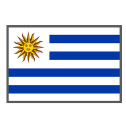 Uruguay: Why?
Uruguay: Why?
This happens every two years. I look at Uruguay's roster. I see all kinds of talented players from the top club teams in Europe. I marvel at the fact that this country has a population of just 3.5 million people. I talk myself into Uruguay. Then I watch them play ... and I draft an email to my editor asking if I can get reassigned to the "watching cardboard just, like, sit on the floor for weeks on end" beat.
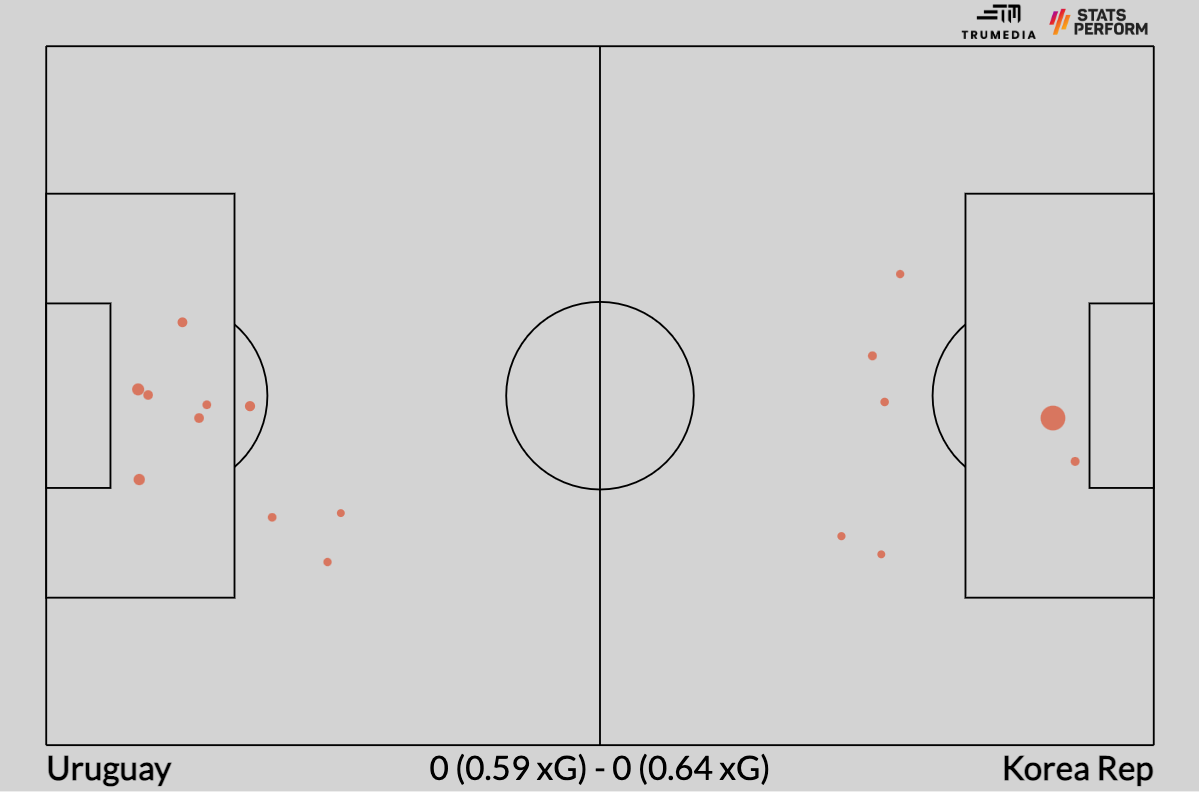
To wit, Darwin Nunez is leading all players across Europe's big five leagues (England, Germany, France, Italy and Spain) in shots attempted per 90 minutes with 5.8. Against South Korea -- a fine team, but also a team that FiveThirtyEight rate as between Tunisia and Cameroon -- he attempted one shot. He's a gigantic, goofy, athletic dynamo who belongs near the goal. Instead, he registered one touch inside the penalty area and 13 ... inside his own half.
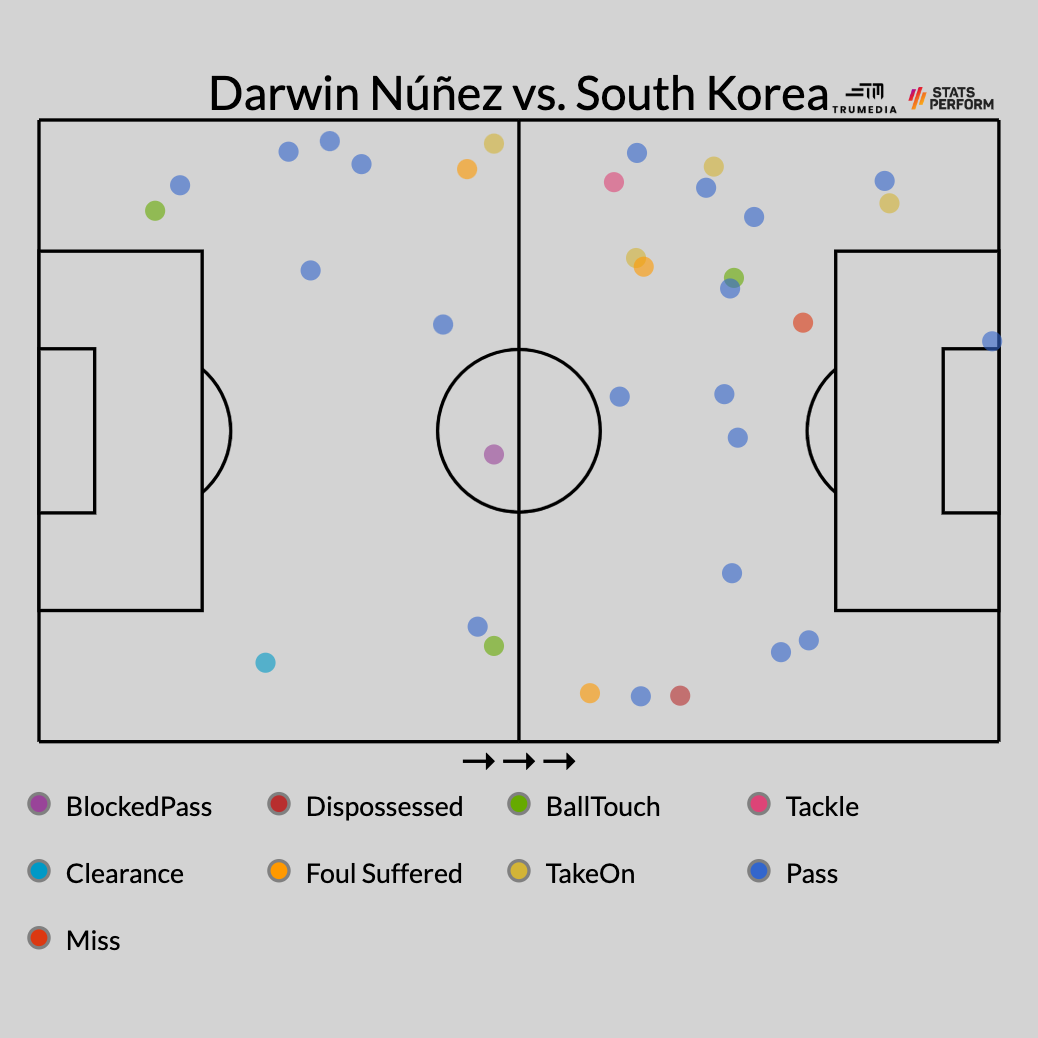
This is almost purely the result of tactical instructions; his instinct is certainly not to drop deep and defend. But oh well. No matter who is on the field or who they're playing, Uruguay continue to try to turn every match into a coin flip. Unsurprisingly, FiveThirtyEight gives them a 57% chance of advancing to the next round.
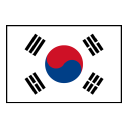 South Korea: Can they get Son going?
South Korea: Can they get Son going?
Korea are one of the few one-player teams in international soccer: a single superstar surrounded by a comparatively mediocre collection of other talent. The consultancy Twenty First Group attempts to rate every professional player in the world using a composite of individual and team performance, and they put out this graphic before the World Cup started that shows how stark the disparity is:
With all World Cup squads now announced - which nations have the highest quality players? pic.twitter.com/d88Gc7ZKoz
— Aurel Nazmiu (@AurelNz) November 15, 2022
Beyond what Uruguay did to themselves, the Koreans shut Uruguay down about as well as you can, too; the only problem is that their superstar, Tottenham's Son Heung-min, barely got involved. He attempted one shot for 0.04 xG and created one chance for a teammate with 0.06 xG. I think it's a similar story to Serbia here. South Korea defended well, and they actually pressed high occasionally and effectively. In fact, their 10 possessions won in the attacking third is tied with Portugal for the most in the tournament. If they can spring Son into space a couple more times a match, they could be a really tough out.
